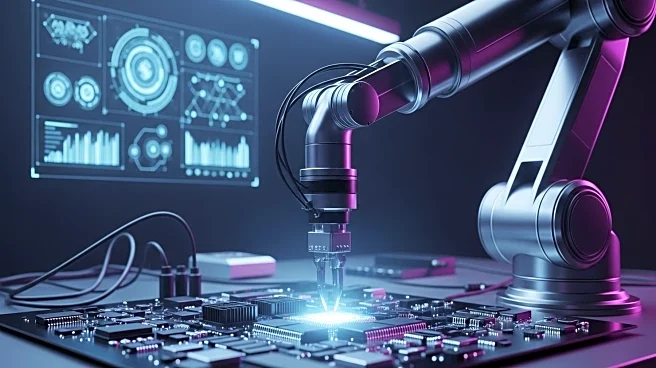What's Happening?
The artificial intelligence revolution is rapidly transforming the global labor market, creating both challenges and opportunities. By 2025, AI is expected to displace 85 million jobs while simultaneously generating 97 million new roles. This shift is driven by automation and the redefinition of work processes, leading to a significant demand for AI-driven workforce reskilling infrastructure. The U.S. government's 'America's AI Action Plan' emphasizes the need to prepare workers for an AI-centric future, with initiatives such as the AI Workforce Research Hub and the integration of AI skills into education programs. Private sector efforts are also robust, with 41% of Fortune 500 companies launching internal AI reskilling programs. The demand for AI-specific skills is accelerating, with AI/ML skill demand growing 40% month-over-month and prompt engineering seeing a 52% year-over-year rise in job postings.
Why It's Important?
The rapid adoption of AI technologies is reshaping the labor market, necessitating urgent investment in reskilling infrastructure. This presents a compelling opportunity for startups and investors to bridge the skills gap. Companies that prioritize AI training experience productivity gains, and AI skills command a wage premium, making reskilling a financially attractive avenue. The World Economic Forum estimates that 50% of all employees will need reskilling by 2025 due to AI and automation. As AI continues to redefine job roles, the demand for specialized skills such as Python expertise and cloud deployment is increasing, attracting venture capital investments in AI infrastructure.
What's Next?
The gap between AI adoption and workforce readiness is creating fertile ground for startups specializing in reskilling infrastructure. Investors are encouraged to act swiftly, as the window for strategic investment is narrowing. Startups are leveraging AI to personalize reskilling, offering platforms that automate skill-gap analysis and deliver tailored learning paths. Investment vehicles focused on AI-driven reskilling are unlocking productivity gains and long-term workforce stability. The future of work is being rewritten by AI, and those who build the infrastructure to reskill the global workforce stand to benefit significantly.
Beyond the Headlines
The ethical implications of AI-driven reskilling are significant, as it addresses the potential job displacement caused by automation. Ensuring equitable access to reskilling opportunities is crucial to prevent widening economic disparities. The integration of AI skills into education programs highlights the cultural shift towards embracing technology in everyday life. Long-term, the focus on reskilling may lead to a more adaptable and resilient workforce, capable of thriving in an AI-driven economy.










